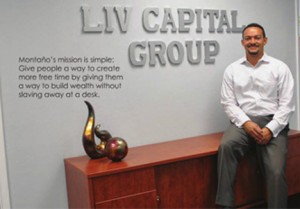“The only thing inferior about being in the foster care system is feeling inferior”

Richard Montaño’s life story can be summarized in one sentence: He went from being a homeless boy to being a successful home investor.
Montaño’s experiences being homeless until the age of nine, and later being forced into the U.S. foster care system, helped him develop a strong feeling for family and community. That feeling, in turn, helped him focus on his goals, becoming a real estate investor after working as an aerospace engineer.
He is currently producing Voiceless, a documentary film that aims to create awareness about the U.S. foster care system.
interviewed Montaño to learn more about his advice for homeless and foster youth, and how they, too, can create a successful future for themselves.
La Prensa San Diego: What do you remember the most about being homeless first and then in foster care? How did those experiences led you to want to help other youth in those conditions?
Richard Montaño: What I remember most is that I was really ostracized from the family that I stayed with, and just never felt comfortable. Even though I was used to moving around so much, the families made it really hard to adjust to the new environments. Being a kid, one particular woman had 3 other kids and they literally had me sleeping in a small closet with a tiny mattress pad. I wasn’t even allowed in the other parts of the house, only the kitchen and a bathroom. The other kids were treated completely different than I was.
It makes me realize the value of being in a home or a child being loved and treated normal, even though normal varies from household to household. But when the child feels normal in their home, they have a system where they respect the people there and they also get that respect back. I spoke to a panel of foster parents and told them that the difference between you and the foster child is that you have a choice; they do not. If you don’t respect that, you’re never going to help the child succeed in any way other than by simply putting a roof over their head. Children need that moral support and that sense of normalcy. You can never truly take away that feeling of being in a temporary location, but the least you can do is try to make the most out of the time they are with you.
LP: What would you tell homeless or foster care youth who many times feel inferior to their peers who have a more traditional family structure?
The only thing inferior about being in the foster care system is feeling inferior. The key is being able to express to these kids what is actually out there and available for them. There’s a ‘curtain of poverty’ that makes it so the kids don’t even know what opportunities they have. They simply think a guy they see driving a Mercedes has that car because someone gave it to him, when, in reality, he had to earn it as well. I would like to share that those opportunities are not given to people; you still have to earn them no matter how well-off you are. And you can earn them as easily as the other person. It’s all about your mindset.
LP: Montaño Companies consist of four entities: Fit Properties, LIV Capital Group, Sofia Living, and Voiceless Film. How are your companies doing right now?
For me, things are going absolutely great. We are staying busy, and constantly have a lot of activity going on as well as a lot of buyers. We are putting a lot of people to work, which is great for the job market. In regards to money, we are spending about $8 to$10 million a year for our various projects around San Diego, and that money translates to vendor sales and labor.
Overall, on the receiving side, we have a lot of buyers that are very aggressive and qualified. Even though people are complaining about prices in general for the real estate industry, our affordability is still great. We are able to spend all of this money because of the high demand that we have, and that translates to more jobs out there as well.
LP: You’re working on the documentary Voiceless, about the foster care system. How’s that project going and when will it be released?
We are officially done with the trailer and are now in the process of scripting out our entire film. We will be selecting our different case studies consisting of various people we want to share the stories of and expand on. Filming beyond the short should be starting late spring or early summer this year. We should complete the filming by the end of the year, continue producing through summer 2016 and hopefully have the finished product late summer or early fall of 2016.
LP: How can the public help in your cause of helping youth?
The public can go to our website, www.voicelessfilm.org/donate, and donate to help us with our project! They can also spread the word about Voiceless and continue supporting us as they already have done so much.
To learn more about Richard Montaño’s successful life story, please visit www.montanocompanies.com.






